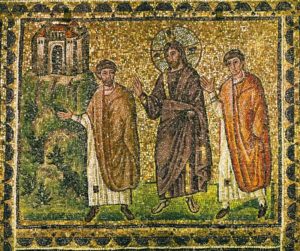
6th century
Mosaic
Church of Sant’Apollinare Nuovo, Ravenna
I am giving a talk soon entitled “attending to Emmaus moments.” – I put it on the schedule at Christ Church Georgetown partly to invite myself to reflect on the way the Emmaus story has been important to me in my journey.
The story shows up in Luke 24, right after the story of the women at the empty tomb. “That same day.” I think the reason this story is so beloved is that it is anchored in everyday life. The disciples walking along the road are grieving and sad in the horrible aftermath of the Crucifixion. They are givingup some of their greatest hopes. And the risen Jesus comes and walks alongside them.
That’s the first thing that appeals. It is the basic mystery in all Christian spirituality. We follow a living Christ — not simply the historical Jesus we meet in the gospels, but the One who is alive always. The one who — as this story presents it literally — walks with us. If the Crucifixion story exposes the worst, the most brutal ruptures in human relationships, the Resurrection stories show relationships being restored, one by one and in different ways. A beloved community being built out of those first witnesses to Resurrection. And the Emmaus story is perhaps the homeliest, the most accessble of all of these stories of witness.
The second thing that appeals: their conversation with him leads to greater understanding. He opens their minds to understand all that the Scriptures have said about him. He helps them to make sense of what does not make any sense. Not through a simple explanation or a box checked, but through his presence. Later, after he disappears – they reflect that “their hearts were burning” as they listened. It’s an experiential, not just an intellectual understanding — the deep “yes” of faith. And an ongoing listening.
And finally, they offer him hospitality,. “Stay with us” they say, and he joins them for a meal. Then, just as he breaks the bread and they recognize him, he disappears from their sight. In my own life and in the lives of others I’ve spoken to, this sense of fleeting encounter is a real experience we have. A quick moment suddenly is filled with graced presence, love, assurance, — and then disappears. We dan’t fully explain it, except for that phrase” our hearts were burning.. . ”
I’ve written a few poems about this experience — connecting the feelings in Emmaus story to those fleeting moments when we recognize the holiness in an everyday encounter, or in a dream or a memory. Here’s one I published some time ago, capturing, I think, that pattern of a kind of disorientation, then an encounter, and then the awareness that something holy has just happened. I wrote the poem before I chose the title: “Emmaus Traveler” realizing only after the poem was written why this encounter had presented itself to me as “holy ground.”
“